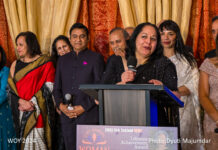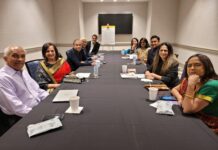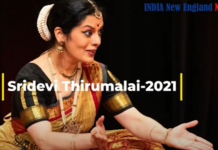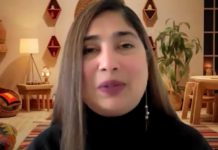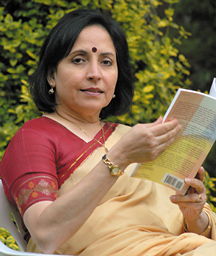 WINCHESTER, Mass. – When Poonam (name changed) contacted Saheli for the first time, she didnot know what to expect. She definitely did not expect the Saheli (friend) to ask her to try and “adjust” with her husband. “Can you try harder to make it work?” the reply came, and Poonam was, in a way, glad. Though she had decided to separate from her husband already, she knew she could depend on this woman to look at the issue from all viewpoints. Gouri Banerjee was on the other side of the conversation, listening to Poonam’s problems. This was the most difficult part for her. Here was this woman asking her what to do with her life. She was going to effect a monumental change in another woman’s life. The girl could not make things work no matter how hard she tried, it seemed like. She wanted to live independently, and Banerjee would help her create her own identity. Now, a year and a half later, Poonam is in the last stages of her divorce, and is thankful to Banerjee. She holds a steady job, and takes care of her baby by herself. “She’s like a mother to me,” Poonam says simply. Poonam is just one of the many women whose lives Banerjee has changed, as founding member, vice-chair and program leader of the domestic violence unit at Saheli, a non-profit organization for South Asian women based in Burlington, Mass. Added to the fact that she teaches full-time as associate professor in the Department of Information Technology at Emmanuel College in Boston, her achievements are magnified. Banerjee teaches four courses, helping students with little or no background in computers understand it better. For a perspective: On an average, Banerjee’s domestic violence unit at Saheli receives two to three calls every week from distressed women, one life is reclaimed and two escape from domestic violence every month. Banerjee insists that the credit is due to the organization – the Sahelis. She is just happy that she has improved someone’s quality of life. “Till date, I’m happy no woman has told me that I advised the wrong course for them,” she says. The journey started nine years ago, when the India Association of Greater Boston wanted to start a women’s wing – to teach women yoga, English and computer skills. The organization, started by Banerjee and Usha Vakil of Hingham, Mass., surprisingly received many calls relating to domestic violence. “We slowly realized that women have other issues too,” says Banerjee. Soon, she was in charge of the domestic violence division of the organization. As the volume of calls grew, she garnered the support of several attorneys, doctors and immigration specialists to advise the women on their best course of action for a reduced fee. A fund of $5,000 is also available now to help these women. Explains Vakil, “Many of these women are very emotional when they call us, and Gouri talks to them, and listens patiently. She also follows up with action, which makes her great at this job.” Meanwhile, the volume of calls kept growing, and volunteers from Banerjee’s unit, which now has eight volunteers, would pick up women who were living in automobiles. “Many of these women were abandoned by their more affluent relatives,” Banerjee says. There were women from Iran, China, Korea as well, and Saheli never turned down any pleas for help. Indeed, the issue of domestic violence has been recognized among the community only recently, and Banerjee has had an uphill task when she first tried educating people of its existence. She remembers the days when the Sahelis were seen as home-breakers. “Nothing could be further from the truth,” she says. “In fact, we do encourage women to try and work it out with their husbands.” The case of a Brookline medical doctor killing his wife, child and father-in-law a few years ago shook the community, and the same people thanked Banerjee for talking about the issue. “What is important is to understand where they come from,” says Banerjee. While the younger volunteers may immediately advocate breaking away, older women like Banerjee and Vakil understand the implications of separation from the husband. “I remember my father’s pressure to get me married, I understand where these girls come from, what issues they face,” says Banerjee. Once a call or an e-mail is received by the hotline, the operator Molly Sarkar channels it to the appropriate person. When Banerjee speaks to the woman, she first establishes what her situation is. “Sometimes, we ask her to go to a shelter, buy an air ticket, tell her husband and just go home,” says Banerjee. Most of the women, though, do not want to return for various reasons. Banerjee then sets up a meeting with the woman based on the urgency of the case. The unit not only advises them on a course of action, it also helps them find subsidized healthcare and legal help. Banerjee has gone to court several times with the victims, and has stood as guarantor for their first apartment lease. Her unit has helped women find jobs and lead a fulfilling life. In the last few years of dealing with domestic violence issues, she realized that a solution for the problem lay largely with the men. Banerjee is now spearheading a campaign in partnership with Asian Task Force against Domestic Violence to educate men about the ill effects of domestic violence. Banerjee came to the United States after her marriage with Gora Banerjee, and settled down in the Boston area. She completed her masters program in liberal arts from Boston University, but found that everything had become computer-based. After a few agonizing months of applying for jobs, she decided to switch over to “soft” computer science – and now deals more with computer systems, the Internet and applied statistics, the last of which is her passion. Banerjee was actively volunteering for various causes even as a student, campaigning for Joseph Timilty’s unsuccessful Boston Mayoral bid in 1975. She remembers the days when she arrived at the campaign office in a sari and with waist length hair. “The candidate would come out of his office to see who I was,” she says. She was active in her two children’s Parent-Teacher Associations since 1982, organizing several events and fundraisers. “That was the training ground for me, where I learned how to do many things related to volunteering,” she says. She advocates volunteering as a way to give back to community. “Volunteering adds a richness and a much deeper layer to life,” she feels. “It’s something you can be passionate about, and also make a difference in someone’s life.” Banerjee’s husband, Gora is semi-retired from his computer business, and their son Rajat, 24, is a software engineer with CISCO in Boxboro, Mass. Their daughter, Joya, 23, works for the UN Family Planning Association in New York. Banerjee’s other interests include literature, and she manages to get translated copies of Bangla literature from India. The couple is active in the Bengali Association, Prabasi, as well. Banerjee is an active member of the Winchester Multi Cultural Network, and is part of a unique club called Asian Eating Club. Every couple of months, the group of women from Japan, China and other Asian countries go to a different restaurant and just eat. On the other side of the balance is Banerjee’s fitness workout at least four times a week. Banerjee is glad that she was given a chance to do so much for the community. “Many of us came here with a good job, and are living the American dream. Not everyone is as lucky. There is a whole class of people out there who came here depending on their relatives, and worked blue-collared jobs,” she says. “I’m glad that I actually discovered our community through Saheli,” she says. A community which is glad to have found Banerjee through Saheli as well.
WINCHESTER, Mass. – When Poonam (name changed) contacted Saheli for the first time, she didnot know what to expect. She definitely did not expect the Saheli (friend) to ask her to try and “adjust” with her husband. “Can you try harder to make it work?” the reply came, and Poonam was, in a way, glad. Though she had decided to separate from her husband already, she knew she could depend on this woman to look at the issue from all viewpoints. Gouri Banerjee was on the other side of the conversation, listening to Poonam’s problems. This was the most difficult part for her. Here was this woman asking her what to do with her life. She was going to effect a monumental change in another woman’s life. The girl could not make things work no matter how hard she tried, it seemed like. She wanted to live independently, and Banerjee would help her create her own identity. Now, a year and a half later, Poonam is in the last stages of her divorce, and is thankful to Banerjee. She holds a steady job, and takes care of her baby by herself. “She’s like a mother to me,” Poonam says simply. Poonam is just one of the many women whose lives Banerjee has changed, as founding member, vice-chair and program leader of the domestic violence unit at Saheli, a non-profit organization for South Asian women based in Burlington, Mass. Added to the fact that she teaches full-time as associate professor in the Department of Information Technology at Emmanuel College in Boston, her achievements are magnified. Banerjee teaches four courses, helping students with little or no background in computers understand it better. For a perspective: On an average, Banerjee’s domestic violence unit at Saheli receives two to three calls every week from distressed women, one life is reclaimed and two escape from domestic violence every month. Banerjee insists that the credit is due to the organization – the Sahelis. She is just happy that she has improved someone’s quality of life. “Till date, I’m happy no woman has told me that I advised the wrong course for them,” she says. The journey started nine years ago, when the India Association of Greater Boston wanted to start a women’s wing – to teach women yoga, English and computer skills. The organization, started by Banerjee and Usha Vakil of Hingham, Mass., surprisingly received many calls relating to domestic violence. “We slowly realized that women have other issues too,” says Banerjee. Soon, she was in charge of the domestic violence division of the organization. As the volume of calls grew, she garnered the support of several attorneys, doctors and immigration specialists to advise the women on their best course of action for a reduced fee. A fund of $5,000 is also available now to help these women. Explains Vakil, “Many of these women are very emotional when they call us, and Gouri talks to them, and listens patiently. She also follows up with action, which makes her great at this job.” Meanwhile, the volume of calls kept growing, and volunteers from Banerjee’s unit, which now has eight volunteers, would pick up women who were living in automobiles. “Many of these women were abandoned by their more affluent relatives,” Banerjee says. There were women from Iran, China, Korea as well, and Saheli never turned down any pleas for help. Indeed, the issue of domestic violence has been recognized among the community only recently, and Banerjee has had an uphill task when she first tried educating people of its existence. She remembers the days when the Sahelis were seen as home-breakers. “Nothing could be further from the truth,” she says. “In fact, we do encourage women to try and work it out with their husbands.” The case of a Brookline medical doctor killing his wife, child and father-in-law a few years ago shook the community, and the same people thanked Banerjee for talking about the issue. “What is important is to understand where they come from,” says Banerjee. While the younger volunteers may immediately advocate breaking away, older women like Banerjee and Vakil understand the implications of separation from the husband. “I remember my father’s pressure to get me married, I understand where these girls come from, what issues they face,” says Banerjee. Once a call or an e-mail is received by the hotline, the operator Molly Sarkar channels it to the appropriate person. When Banerjee speaks to the woman, she first establishes what her situation is. “Sometimes, we ask her to go to a shelter, buy an air ticket, tell her husband and just go home,” says Banerjee. Most of the women, though, do not want to return for various reasons. Banerjee then sets up a meeting with the woman based on the urgency of the case. The unit not only advises them on a course of action, it also helps them find subsidized healthcare and legal help. Banerjee has gone to court several times with the victims, and has stood as guarantor for their first apartment lease. Her unit has helped women find jobs and lead a fulfilling life. In the last few years of dealing with domestic violence issues, she realized that a solution for the problem lay largely with the men. Banerjee is now spearheading a campaign in partnership with Asian Task Force against Domestic Violence to educate men about the ill effects of domestic violence. Banerjee came to the United States after her marriage with Gora Banerjee, and settled down in the Boston area. She completed her masters program in liberal arts from Boston University, but found that everything had become computer-based. After a few agonizing months of applying for jobs, she decided to switch over to “soft” computer science – and now deals more with computer systems, the Internet and applied statistics, the last of which is her passion. Banerjee was actively volunteering for various causes even as a student, campaigning for Joseph Timilty’s unsuccessful Boston Mayoral bid in 1975. She remembers the days when she arrived at the campaign office in a sari and with waist length hair. “The candidate would come out of his office to see who I was,” she says. She was active in her two children’s Parent-Teacher Associations since 1982, organizing several events and fundraisers. “That was the training ground for me, where I learned how to do many things related to volunteering,” she says. She advocates volunteering as a way to give back to community. “Volunteering adds a richness and a much deeper layer to life,” she feels. “It’s something you can be passionate about, and also make a difference in someone’s life.” Banerjee’s husband, Gora is semi-retired from his computer business, and their son Rajat, 24, is a software engineer with CISCO in Boxboro, Mass. Their daughter, Joya, 23, works for the UN Family Planning Association in New York. Banerjee’s other interests include literature, and she manages to get translated copies of Bangla literature from India. The couple is active in the Bengali Association, Prabasi, as well. Banerjee is an active member of the Winchester Multi Cultural Network, and is part of a unique club called Asian Eating Club. Every couple of months, the group of women from Japan, China and other Asian countries go to a different restaurant and just eat. On the other side of the balance is Banerjee’s fitness workout at least four times a week. Banerjee is glad that she was given a chance to do so much for the community. “Many of us came here with a good job, and are living the American dream. Not everyone is as lucky. There is a whole class of people out there who came here depending on their relatives, and worked blue-collared jobs,” she says. “I’m glad that I actually discovered our community through Saheli,” she says. A community which is glad to have found Banerjee through Saheli as well.




